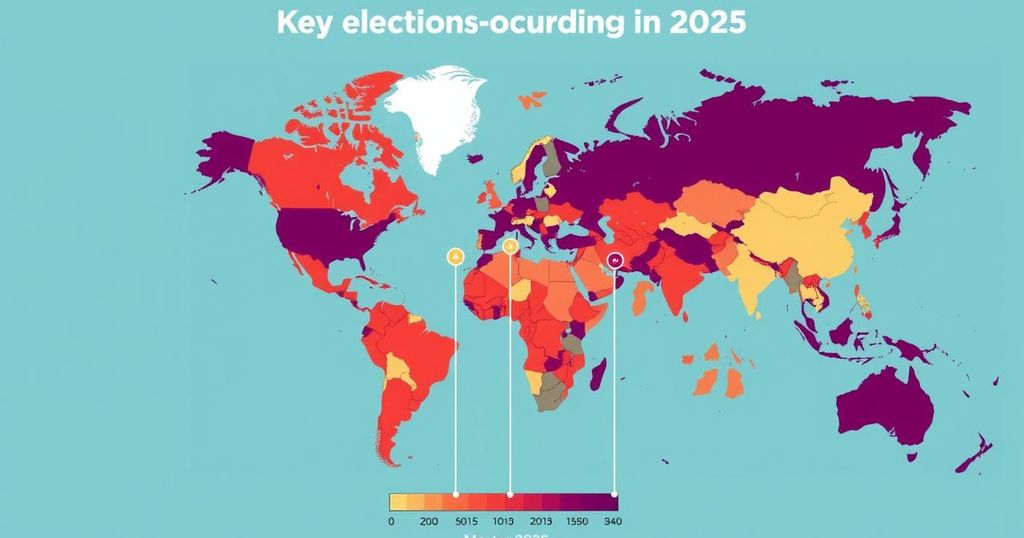Key Global Elections Scheduled for 2025: An Overview

In 2025, significant elections will occur in Belarus, Germany, Chile, the Philippines, and Canada, spotlighting themes of inflation, populism, and international unrest. Experts analyze the stakes involved, from authoritarianism in Belarus to economic challenges in Germany and political tensions in the Philippines and Canada. How these elections unfold will impact local and global dynamics in the years to come.
In 2025, several significant elections will unfold across the globe despite the relatively lower electoral activity compared to 2024. Key elections to observe include Belarus, Germany, Chile, the Philippines, and Canada, all of which engage voters with pressing issues like inflation, populism, and international unrest. Experts provide insights on the stakes involved in these elections, highlighting the formidable challenges political leaders face and their potential impact on both domestic and global landscapes.
In Belarus, President Alexander Lukashenko is set for his seventh consecutive term on January 26, 2025, amid a political climate stifled by repression and absence of meaningful opposition. Notably, those vying for nomination have shown support for his policies, further entrenching his governance. With more than 1,200 political prisoners and widespread unrest since the 2020 elections, Lukashenko’s victory could solidify Belarus’ role as a Russian ally.
Germany’s early federal election on February 23, 2025, follows the dissolution of the coalition government led by Chancellor Olaf Scholz. Economic difficulties and geopolitical tensions, particularly from the Ukraine conflict, exacerbate the precarious state of the government. Scholz’s party is struggling to maintain public support against conservative rivals, leading to growing speculation regarding a possible change in leadership.
The Philippines will conduct midterm elections on May 12, 2025, where the composition of the Senate is in the spotlight. President Ferdinand Marcos Jr. must navigate a fraught political landscape marked by tensions with Vice President Sara Duterte. Feedback on polling suggests that candidates supported by Marcos may dominate, potentially allowing him to consolidate power and stave off challenges to his presidency.
In Canada, Prime Minister Justin Trudeau faces a likely federal election before the scheduled deadline, primarily due to governmental instability and plummeting approval ratings. His coalition’s fragility stems from significant internal conflict and external pressures, threatening Trudeau’s goal of progressive policies against rising populist sentiments that support Conservative leader Pierre Poilievre.
Chile’s presidential election on November 16, 2025, follows two failed constitutional reforms during Gabriel Boric’s presidency. With Boric ineligible for re-election, the question looms over who will emerge as the pivotal candidate from the left, as the opposition gains ground. The public yearns for decisive leadership in the aftermath of the nation’s tumultuous political landscape.
In summary, the elections in Belarus, Germany, the Philippines, Canada, and Chile in 2025 are set to shape not only domestic policies but also have broader implications for regional stability and geopolitical alliances.
The 2025 global elections will serve as reflections of ongoing political dynamics influenced by economic stresses, populist movements, and international conflicts such as the wars in Europe and the Middle East. Each country faces unique challenges; Belarus under an authoritarian regime continues to suppress opposition, while Germany grapples with an economic landscape plagued by competition and reinvigorating populism. Similarly, other nations are facing pivotal moments as leadership, governance, and population sentiments evolve, making these elections critical to understanding future political trajectories.
The elections in Belarus, Germany, the Philippines, Canada, and Chile will be pivotal in assessing the various challenges confronting political leaders and their populations. Each nation grapples with distinct issues, from authoritarianism and economic instability to the quest for power consolidation and addressing public discontent. The outcomes of these elections will undoubtedly influence local governance as well as international relations, reflecting the changing political tides as the world stands on the brink of transformation.
Original Source: www.ndtv.com






